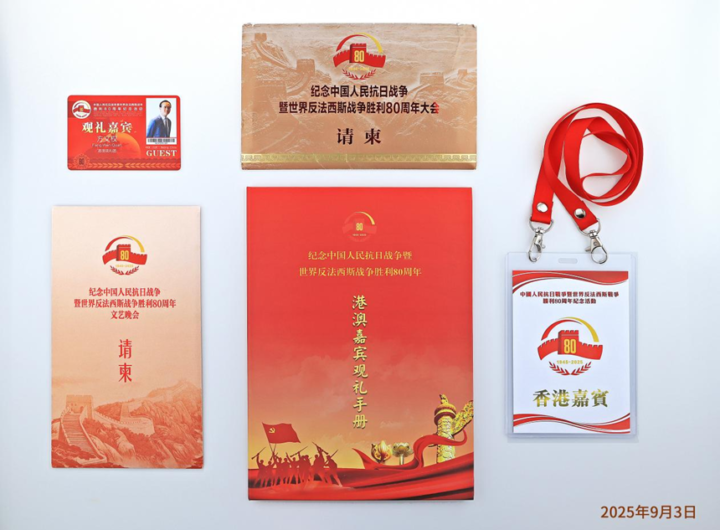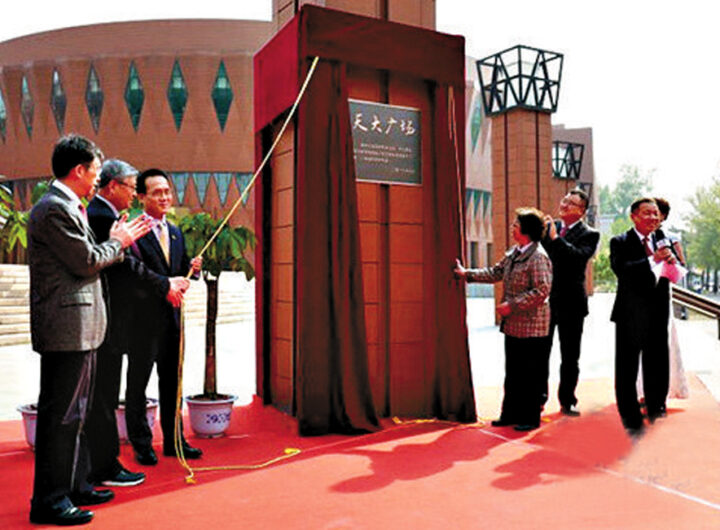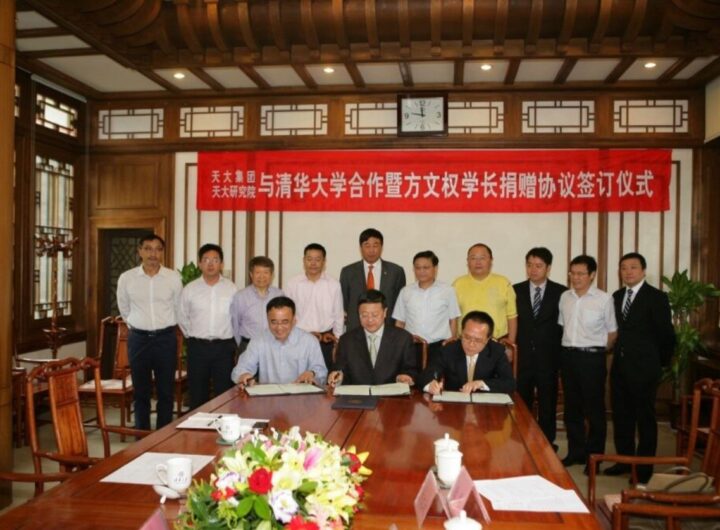
Following the successful conclusion of the 20th National Congress of the Communist Party of China (CPC) in Beijing, Hong Kong communities have been keen to study the report and discuss its implementation enthusiastically. On 31st October, the 7th Symposium on “one country, two systems” and the Basic Law of the Hong Kong Special Administrative Region (HKSAR) was held at Hong Kong Convention and Exhibition Centre, with emphasis on carrying forward the spirit of the 20th National Congress of CPC, upholding and improving “one country, two systems”. The event was co-hosted by the Bauhinia Magazine, Tianda Institute, the Institute of Guangdong, Hong Kong and Macao Development Studies at Sun Yat-sen University, and the Center for Hong Kong and Macao Studies at Tsinghua University. Officiating party included the Secretary for Justice Paul Lam Ting-kwok, Deputy Chief Secretary for Administration Warner Cheuk Wing-hing, Board member of the Bauhinia Culture Group Wu Bao-an, Chairman of Tianda Institute Fang Wen-quan, Deputy Director of Law Department of Liaison Office of the Central People’s Government in HKSAR Zhang Yu-mei, Director of Press and Public Relations Department of Office of the Commissioner of the Ministry of Foreign Affairs of the People’s Republic of China in the HKSAR Huang Jing-rui, Secretary for Education Choi Yuk-lin, and Director of Bauhinia Magazine Yang Yong.
In his welcoming speech, Wu Bao-an, board member of the Bauhinia Culture Group, said that the report to the 20th National Congress of CPC comprehensively summarized the achievements of the implementation of “one country, two systems”, especially Hong Kong’s historic transitioning from chaos to order. It also systematically elucidates the new concepts, ideas and strategies to uphold and further enhance the concept of “one country, two systems”, and reiterates that “one country, two systems” is the best institutional arrangement which must be upheld as a long term pursuit. It is a high-level affirmation and a solemn declaration to the world of the successful implementation of ”one country, two systems”. It also provides fundamental guidelines for the conduct of affairs in Hong Kong and Macau in future.
Wu furthered added that the resolution on amendments to the Constitution of CPC passed at the 20th National Congress that provide for the principles of the comprehensive, accurate and unswerving implementation of “one country, two systems” in the Constitution fully reflects the important status of “one country, two systems” in China’s development roadmap, and the Central Government’s unwavering determination to carry forward “one country, two systems”. The 20th National Congress also emphasized the governance of Hong Kong and Macau in accordance with law, and the maintenance of the constitutional order of the two special administrative regions conferred by the Constitution and the Basic Law, which provides solid legal safeguards for the development of Hong Kong. Since its inception, the Symposium has attracted experts and scholars from the two regions to discuss major theoretical issues, with fruitful research results achieved, and become a well-known academic event focusing on affairs of Hong Kong and Macau making a positive impact on the implementation of “one country, two systems”. The seminar serves as an important platform for promoting and gathering mainstream values, and a major impetus to help Hong Kong start a new chapter.
In his speech, the Secretary for Justice Paul Lam Ting-kwok explained that the principle of “one country, two systems” is a complete system which safeguards the supreme principles of national sovereignty, security and development interests, allowing Hong Kong and Macau to maintain the capitalist system, and enjoy a high degree of autonomy. The socialist system on the other hand remains the fundamental system of the People’s Republic of China, with the leadership of the CPC being a defining feature of socialism with Chinese characteristics. Hong Kong residents must conscientiously respect and uphold “one country, two systems” in their daily work and life, so that the two special administrative regions can fully enjoy the unlimited room for development under the system. Lam added that the Department of Justice will continue to promote education on the rule of law in local communities and enhance people’s understanding of the Basic Law and the Constitution.
Deputy Chief Secretary for Administration Warner Cheuk Wing-hing highlighted in his speech that for “one country, two systems” to be implemented smoothly and successfully, we must uphold the Central Government’s overall jurisdiction over the SARs and secure the SAR’s high degree of autonomy. “One country, two systems” is a great development of socialism with Chinese characteristics, which is the best institutional arrangement to maintain long-term prosperity and stability for Hong Kong and Macao, and must be adhered to over the long run.
Cheuk said the Constitution and the Basic Law form the constitutional basis of the HKSAR. The Chief Executive announced in his Policy Address on 19 October 2022 that the Basic Law Promotion Steering Committee, led by the Chief Secretary for Administration, will be renamed the Constitution and the Basic Law Promotion Steering Committee to underline the importance the Government attaches to the promotion of the Constitution. We will further strengthen publicity and education on the Constitution, the Basic Law and the National Security Law. “Unity is strength. We need to work together, maintain the successful practice of “one country, two systems” in Hong Kong, and embrace the new chapter from governance to prosperity.” Cheuk added.
Pauline Ng, Director of Hong Kong Policy Research Centre, Tianda Institute, spoke on behalf of Tianda Institute, one of the organizers. “Governing HKSAR in accordance with law, upholding the Central Government’s overall jurisdiction, and implementing the principle of patriots administering Hong Kong are the prerequisites to maintain Hong Kong’s prosperity and stability.” She said. Pauline also added that Tianda Institute would continue to perform strategic research for the long-term prosperity and stability of the nation as well as development of Hong Kong scientifically and prudently.
Tam Yiu-chung, member of the Standing Committee of the NPC, delivered the keynote speech via video entitled The Spirit of the 20th National Congress of CPC as the Guideline for the Implementation of the Basic Law. Maria Tam, Deputy Director of the Basic Law Committee, delivered her speech entitled New Era and New Journey. Wang Zhen-min, a representative of the 20th National Congress of CPC and professor of School of Law at Tsinghua University, delivered a speech online on the topic of Upholding and perfecting the “One Country, Two Systems” System. Mrs. Rita Fan, former member of the Standing Committee of the NPC and the first President of the Legislative Council, delivered her speech entitled Our Mission: Steadfast implementation of “One Country, Two Systems” over the long term. Albert Hung-yee Chen, member of the Basic Law Committee and professor of the Faculty of Law at HKU, delivered his speech titled “One Country, Two Systems” and Governing Hong Kong in accordance with Law. Lin Laifan, Director of Center for Hong Kong and Macau Studies at Tsinghua University, gave a speech on Carry forward the “One Country, Two Systems” Principle over the long run, Uphold the Authority of the Constitution and the Basic Law in HKSAR. Chen Hong-duan, member of the Macau Basic Law Committee and professor of Peking University Law School, delivered a speech on Guardian of the Constitutional Order of the Special Administrative Region. Tian Fei-long, member of Chinese Association of Hong Kong & Macao Studies, associate professor of the Law School at Beihang Univesity and senior fellow of Tianda Institute, delivered a speech with the theme of Law of Practice and Legal Guarantee of “One Country, Two Systems” from the Report to the CPC 20th National Congress
This Symposium was attended by some 200 social dignitaries across the business, political and academic sectors. This is the 7th Symposium, since the first one organized in 2016, which has become a high-level symposium for research in the relevant fields. It has received wide acclaim from various sectors and the broader community, as well as wide media coverage at home and abroad, thereby making meaningful and valued contribution for the prosperity and development of Hong Kong AI-assisted automatic subtitle and simultaneous interpretation service was provided at the Symposium to provide better experience for the audience with real-time subtitles.





